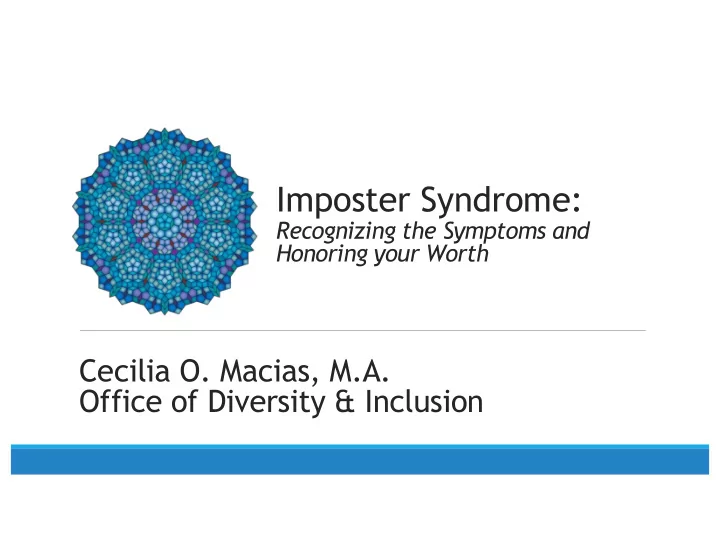

Imposter Syndrome: Recognizing the Symptoms and Honoring your Worth Cecilia O. Macias, M.A. Office of Diversity & Inclusion
My Own Journey • First generation • Attended PWI’s • Professional trajectory • Personal social identities
Participants will... • Develop an understanding of the concepts of impostor syndrome • Identify how impostor syndrome can be present in the conscious and subconscious • Be able to assess their own experiences as it relates to the concept • Learn methods to assist in developing coping mechanisms
Imposter Phenomenon Dr. Pauline R. Clance & Dr. Suzanne A. Imes ● (1978) – Psychologists Those who suffer from imposter syndrome ● tend to be very successful Research amongst high achieving women - ● “An internal experience of intellectual phoniness” Impostor syndrome arises in spaces of ● achievements where judgments are made Feeling like an imposter doesn't have much ● to do with what you have done . It has to do with how you feel
What is Impostor Syndrome? It can strike anyone – but its particularly ● prevalent among women, minorities, and people from less privileged socioeconomic backgrounds Being consistently anxious you’ll be ‘found out’ ● and convinced you don’t really deserve success Despite external evidence of their competence, ● those with the syndrome remain convinced that they are frauds and do not deserve the success they have achieved an internal experience and distorted thinking ● that one is not intelligent and has fooled everyone who believes otherwise (Clance & Imes, 1978)
Common Symptoms When people praise you, you fear you won’t live up to their ● expectations You feel your success is due to luck, despite your actual track record of ● achievements You're afraid others will discover how little you know ● When you succeed, you have doubts about being able to do it again ● You believe others are more intelligent than you ● You feel you need to work harder than others in order to prove your ● worth You always have a backup plan ready in case you’re “discovered” for ● the fraud you believe yourself to be You seek external validation, yet don’t fully believe it when it comes ●
Dialogue Pair & Share Reflecting on your past experiences: ● Do you feel like you’ve experienced imposter syndrome at some point? ● Have you ever kept yourself from doing something that you wanted? What contributed to that decision? ● If so, what did that feel like?
Why Does it Matter? Stress ● Physical & emotional effects ● Relationship issues ● Lack of personal & professional ● satisfaction Unreached potential ●
How Did You Get Here? Early family influences ● Messages about success and failure ● Myths and labels ● First in your family ● Decision to pursue an alternative path ● Pressure to represent your group ● Limited diversity ● Unsupportive organizational cultures ● Competition, hostility ●
Impostor Syndrome Experiences Worksheet
What Can You Do? Acknowledge the presence of impostor syndrome • Stop! Recognize the triggers and reframe. • Why am I having these feelings? Are they rational? • Consistent and insistent positive self-talk • Your preparation and contribution is valuable/necessary • Surround yourself with encouraging affirmation • Community - Mentor(s), Peer(s) • Visual cues/images/messages • Therapy • Identify and leverage your strengths • Become a knowledge expert • Consult your mentor(s) or sponsor(s) • Acknowledge the evidence that highlights your competence; • own your success Evaluate your environment •
Dialogue Pair & Share Knowing the effects of Imposter syndrome, consider the following: ● What are 1-2 steps you can take to support yourself and others struggling with imposter syndrome?
Additional Resources The Impostor Phenomenon Overcoming the Fear that Haunts Your ● Success, Dr. Pauline Rose Clance Secret Thoughts of Successful Women Why Capable People Suffer ● from the Impostor Syndrome and How to Thrive in Spite of It, Valerie Young The Confidence Code The Science & Art of Self-Assurance – What ● Women Should Know, Katty Kay & Claire Shipman The Empress Has No Clothes Conquering Self-Doubt to Embrace ● Success, Joyce M. Roche
References Meninger, K. Fight the Imposter Syndrome Improve Your Confidence ● & Career. Mount, P . Impostor Syndrome. ● Revuluri, S. How to Overcome Impostor Syndrome. ● Young, V. 5 Weeks to Confidence and Overcoming the Impostor ● Syndrome.
Recommend
More recommend